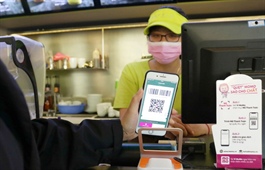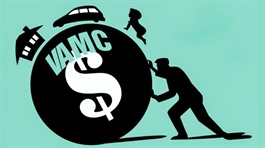Banks anticipate real estate credit rally
Banks anticipate real estate credit rally
As the Vietnamese authorities continue to tighten controls on potentially hazardous industries, financial institutions are beginning to place more restrictions on real estate-backed loans.

According to the State Bank of Vietnam (SBV), at the end of Q1 2022, outstanding credit for the real estate industry represented 7 per cent of the overall outstanding credit balance. If including individual loans to purchase homes to live in, real estate accounted for 20 per cent of the total outstanding amount.
The SBV’s plan to tighten the credit demand for real estate has been discussed for years (see Page 24). However, banks are already giving preference to qualified customers who have genuine requests, as well as prominent property developers after conducting a comprehensive due diligence investigation.
Nguyen Quoc Hung, general secretary of the Vietnam Banks Association, said, “It is necessary for banks and local authorities to take into account current requirements for housing and land. If property-backed credit is excessively restrictive, it would be difficult for enterprises to get financing to undertake projects, which will result in an increase in the price of real estate. Therefore, unintentionally, those who have genuine housing needs are lumped in with real estate speculators.”
Hung also recommended that banks should reject projects that do not have legal guarantees, which may lead to various repercussions in the future.
Real estate lending is flying high on banks’ agenda. For instance, regarding the loan structure of lender MB, home loans still accounted for the highest proportion of about 33.2 per cent of the total outstanding loans, followed by car and motorcycle loans (22.7 per cent) and manufacturing loans (15.4 per cent).
The bank actively controlled the proportion of loans to real estate and construction at around 10 per cent of the total outstanding loans by the end of the first quarter, with the bad debt ratio of this segment being about 0.14 per cent.
Besides this, MB mainly holds real estate and clean renewable energy bonds, of which total credit loans of the real estate sector were VND5.1 trillion ($221.7 million). The management said that the bonds held by MB are attached to projects with high profitability.
In the same vein, Techcombank is now among the banks with the highest proportion of outstanding loans for the real estate sector in the industry. Nguyen Duc Huy, an analyst at KB Securities, believed that as a result, tight control of real estate credit will affect the bank’s financial lending activities.
In particular, Techcombank’s real estate lending will be under pressure as outstanding loans grew by only 2.35 per cent year-to-date in Q1 2022, compared to 4.98 per cent in the same period last year. Home loans are less affected, reaching 6.2 per cent year-to-date in the first quarter.
“We anticipate that the bank’s home loans will improve in the second half of 2022 when the SBV loosens real estate credit control. Furthermore, various key projects by Vinhomes and Masterise have opened for sale in this quarter,” Huy said.
Techcombank CEO Jens Lottner said, “In the previous five years, Techcombank has had no issues with real estate loans, and the bad debt proportion for this portfolio is almost nil. Consequently, the bank will keep its approach in the long-term.”
Besides MB and Techcombank, other lenders such as Viet Capital Bank, VPBank, MSB, and Eximbank also recorded a proportion of real estate loans greater than 10 per cent of total outstanding loans by the end of 2021.
Nguyen Manh Quan, acting CEO of ABBank, said that the bank maintains a risk management mechanism by focusing on prestigious investors who have financial ability. “The goal of tightening the reins on real estate loans is to flush out dishonest and unethical players in the market and promote a more stable housing market,” he said.
Nguyen Duc Vinh, CEO of VPBank, came to the conclusion that it is important to restrict lending policy in the real estate sector to avoid the spill-over effect of the real estate bubble.
“However, real estate was, is, and will continue to be a vital component of the economy, particularly with regard to the commercial banking system. Property will continue to be an essential part of VPBank’s lending structure,” Vinh said. “Purchasing a home and a vehicle are both fundamental and practical necessities for consumers, and as a result, it is imperative for financial institutions to provide credit in these markets.”
The Vietnam Real Estate Brokers Association advises authorities to impose regulations to safeguard transparent real estate businesses in addition to safeguarding individual investors in high-risk financial markets. Moreover, capital must be made available for all sectors of the economy.
“The moment has come for the authorities to offer business policies that are more open in order to attract international investors, in addition to successful products such as real estate investment funds, stocks, real estate mortgage-backed securities, housing trust funds, and the like,” the association noted.

























